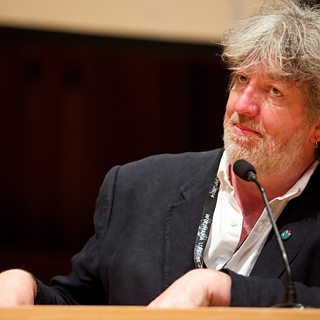Public service broadcasting is broadcasting intended for public benefit rather than to serve purely commercial or government interests, and it is the thing the 91�ȱ� is best known and most loved for. As a publicly funded, public service organisation, the 91�ȱ� exists to “inform, educate, and entertain”, and radio and TV broadcasting have been the main methods of reaching the public and delivering this mission for much of the 91�ȱ�’s history.
Project from 2018 - present

Image above by on Flickr, .
Over the past twenty years television and radio have been complemented by the internet, which has become a vital communications platform for the delivery of the 91�ȱ�’s public service mission, not least because it can be used for much more than delivering radio and television programmes to connected devices, important though that is. The two-way nature of the network creates a very different space from the one-way broadcasting model, and dynamic publishing tools like the World Wide Web allow the internet to host material that engages audiences in new ways.
Today, the scope for using the internet for public benefit rather than to serve purely commercial or government interests has grown. This has prompted a group within 91�ȱ� Research & Development to work towards clarifying what this might mean and how the 91�ȱ� could help create an internet that more easily supports the online ambitions of public service organisations of all types, around the world.
This is important because the internet has become a necessary medium for engagement with the contemporary world. It is complex, dynamic, global and distributed in nature, and it provides the foundations for many public goods and services. One way to express this is to say that the internet has become a de facto public utility, although it is not yet handled like one politically or economically. The internet has come to feel fundamental to our lives - almost like, say, water. But, unlike water, the network is not natural and not value-neutral. It was designed and built by people, and it embodies the cultural philosophies of, and reflects technical choices made by, those people.
Since its creation around thirty-five years ago the internet has developed in ways that naturally reflect the cultural, economic, and political perspectives of the people, companies, communities, and governments who use, influence, and control it. Perhaps the internet’s very success can make it appear “perfect” or “just the way it is”, but there’s nothing elemental or primordial about this complex collection of interconnected networks and how it has been used: it was created to work in a certain way and emphasise certain things, and the billions of people who use it everyday have to live with the consequences of engineering, technical, and political decisions made throughout its history.
While the internet has been hugely transformative in our modern world, it wasn’t developed with requirements of public service organisations like the 91�ȱ� in mind and as a result there are aspects of today’s network that make it harder to deliver public service outcomes than commercial ones - advertising is easy, creating safe online spaces for debate remains hard.
With this in mind the 91�ȱ�, in common with other organisations concerned about the public good such as the , and the , is exploring ways in which today’s internet can be re-imagined, changed, or perhaps even re-invented in ways that better support the delivery of public benefits and reduce its potential for harm.
What is Public Service Internet?
“Public Service Internet” (“PSI” for short) is a new generation of projects, generally based in 91�ȱ� Research & Development, that are exploring and advancing the notion of an internet where public service activity is much easier than it is today. This does not have to mean it’s harder to be a commercial operator, but that we want to prioritise public service outcomes.
Throughout its history the 91�ȱ� has sought to nurture civic society and deliver the public benefits of mass communication content and technology. The 91�ȱ� has an extensive history of innovation and active involvement in the public sphere, even beyond broadcast and content production, and this work continues in 91�ȱ� R&D. We aim to conceive an internet that works in the public interest and better serves civic society in the UK and around the world.
Our model of a Public Service Internet is centred on four key themes, all of which relate to the 91�ȱ�’s core principles but are also relevant to other public service organisations, including public service broadcasters as they move online. None of them is solely of interest to the 91�ȱ�.
- Public-Controlled Data - Treat data as a public good: put data back in the hands of people, enhance privacy, and give the public autonomy and control over the data they create.
- Equal Access for Everyone - Ensure equity of access to the network and to reliable, accurate and trusted information shared over it.
- A Healthy Digital Public Sphere - Develop technology and editorial output aligned to the 91�ȱ�’s core values in order to create healthy online relationships between licence fee payers and the 91�ȱ�, by providing safe, open, diverse, and accessible digital public spaces and promoting digital wellbeing through ethical design.
- Public Service Networking - Stimulate innovation toward and investment in internet technologies that are expressly architected, designed, built, and deployed to meet the specific requirements of public service organisations and activities more fully than the current TCP/IP suite (the set of standards that make the internet work), and work for their widespread adoption alongside other engineering innovations.
The 91�ȱ� does not aim to deliver such far-reaching change on its own, but in partnership and collaboration with the many other bodies that see the need for changes to today’s internet.
How to Get Involved
The Public Service Internet activity provides a multidisciplinary and collaborative platform for research and development to address emerging challenges, explore new opportunities and alternatives, and ultimately, re-imagine the internet to deliver new forms of public value. We do not claim ownership of the mission to build a better public service internet - this must be a collective endeavour - nor do we regard PSI as a single project, rather we see it as a collection of activities grouped by their mutual aims. 91�ȱ� R&D want to share our work here and collaborate with others who share our values and goals - we are already aware of many other groups and organisations actively engaged in this field. If you are working on similar projects and want to work with us, we’d love you to get in contact.
Project Team
Project updates
-

Future Experience Technologies section
This project is part of the Future Experience Technologies section
-

Internet Research and Future Services section
The Internet Research and Future Services section is an interdisciplinary team of researchers, technologists, designers, and data scientists who carry out original research to solve problems for the 91�ȱ�. Our work focuses on the intersection of audience needs and public service values, with digital media and machine learning. We develop research insights, prototypes and systems using experimental approaches and emerging technologies.





